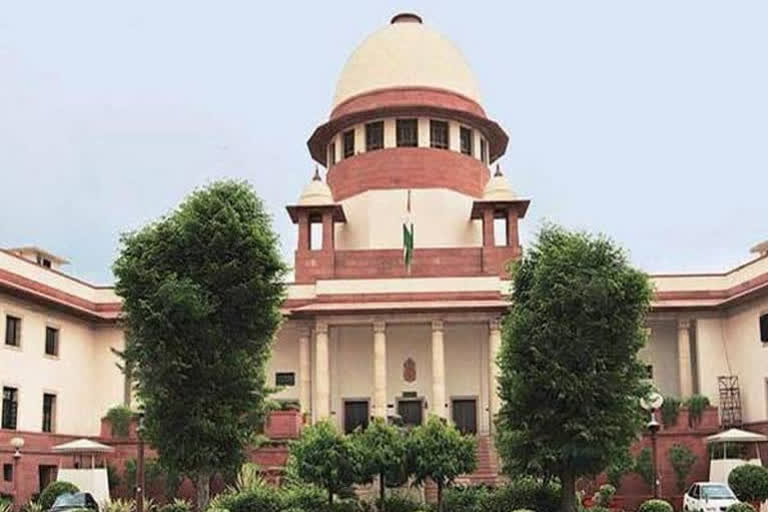नई दिल्ली: एक हिंदू संस्था ने उच्चतम न्यायालय के समक्ष दावा किया कि मुगल बादशाह बाबर न तो अयोध्या गया था और और न ही विवादित राम जन्मभूमि-बाबरी मस्जिद स्थल पर 1528 में मस्जिद बनाने के लिए मंदिर को ध्वस्त करने का आदेश दिया था.
एक मुस्लिम पार्टी द्वारा दायर मुकदमे में प्रतिवादी अखिल भारतीय श्री राम जन्म भूमि पुनरुद्धार समिति ने प्रधान न्यायाधीश रंजन गोगोई की अध्यक्षता वाली पांच न्यायाधीशों की संविधान पीठ के समक्ष बाबरनामा, हुमायूंनामा, अकबरनामा और तुजुक-ए-जहांगीरी जैसी ऐतिहासिक पुस्तकों का उल्लेख किया. संस्था ने कहा कि इनमें से किसी में भी बाबरी मस्जिद के अस्तित्व के का जिक्र नहीं किया गया है.
हिन्दू संस्था की ओर से पेश वरिष्ठ वकील पी एन मिश्रा ने दशकों पुराने मामले में हो रही सुनवाई में 14वें दिन कहा कि इन पुस्तकों, खासकर बाबरनामा में प्रथम मुगल बादशाह के सेनापति मीर बाकी द्वारा अयोध्या में बाबरी मस्जिद का निर्माण या मंदिर गिराए जाने का कोई जिक्र नहीं है.
मिश्रा ने पीठ से कहा कि बाबर अयोध्या नहीं गया था और इसलिए उसके पास 1528 में मंदिर के विध्वंस और मस्जिद के निर्माण का आदेश देने का कोई अवसर नहीं था. इसके अलावा, मीर बाक़ी नाम का कोई व्यक्ति उसका कमांडर नहीं था.
पढ़ें-SC में अयोध्या केस का 13वां दिनः निर्मोही अखाड़ा ने कहा कि वह 'राम लला' के दावे का विरोध नहीं कर रहा
पीठ में न्यायमूर्ति एसए बोबडे, न्यायमूर्ति डी वाई चंद्रचूड़, न्यायमूर्ति अशोक भूषण और न्यायमूर्ति एसए नाजेर भी शामिल हैं.
मिश्रा ने पीठ से कहा कि मीर बाकी अयोध्या पर आक्रमण का नेतृत्व करने वाला सेनापति नहीं था. इस पर पीठ ने उनसे सवाल किया कि वह इन ऐतिहासिक पुस्तकों का उल्लेख करके क्या साबित करने की कोशिश कर रहे हैं.
मिश्रा ने कहा कि जहां तक मुसलमानों के मामले का सवाल है, बाबरनामा पहली ऐतिहासिक पुस्तक है और 'प्रतिवादी होने के नाते मैं उनके मामले को खारिज करना चाहता हूं. उन्होंने कहा कि हमारे मंदिर को मस्जिद घोषित किया जाए.'
उन्होंने कहा, 'अगर किसी इमारत को मस्जिद घोषित किया जाना है तो उन्हें यह साबित करना होगा कि बाबर वहां से वाकिफ था.'
मिश्रा ने कहा कि बाबरनामा बादशाह के जीवन के 18 वर्षों से संबंधित है, लेकिन उसमें अयोध्या में किसी मस्जिद के बारे में जिक्र नहीं करता. इसके अलावा जब तथाकथित मस्जिद का निर्माण करने का आदेश दिया गया था, उस समय बादशाह राजा आगरा में था. मिश्रा ने कहा, 'कोई आदमी झूठ बोल सकता है, लेकिन हालात झूठ नहीं बोलते.'
उन्होंने कहा कि बाबर ने अवध के मुस्लिम शासक इब्राहिम लोदी को पराजित किया और उसकी हत्या कर दी और फिर उसके भाई को क्षेत्र का कमांडर बना दिया. उन्होंने कहा कि यहां मुसलमानों ने कहा कि मीर बाकी बाबर का सेनापति था जो गलत है.
पढ़ें-अयोध्या मामला: पढ़ें 12वें दिन की सुनवाई में दी गई दलीलें
उन्होंने कहा कि जिन तथाकथित शिलालेखों में मस्जिद के अस्तित्व का जिक्र है, उन्हें सबसे पहले 1946 में देखा गया था जब एक मजिस्ट्रेट ने वहां का दौरा किया था और उसका कहना था कि शिलालेख फर्जी थे.
उसके बाद मिश्रा ने अबुल फजल की किताब आइन-ए-अकबरी का भी संदर्भ दिया और कहा कि 1576 में उसमें अयोध्या में रामकोट के बारे में लिखा गया जिसे हिंदुओं द्वारा भगवान राम के जन्म स्थान के रूप में पूजा जाता था.
उन्होंने कहा कि लेकिन इस किताब में अयोध्या में किसी मस्जिद के होने का जिक्र नहीं है.
मिश्रा ने कहा कि यह बात स्थापित है कि मस्जिद का निर्माण बाबर ने नहीं बल्कि औरंगजेब ने कराया था और उसने मथुरा और काशी में मंदिरों को गिरवा दिया था. उन्होंने कहा कि दिवानी मामले में यह प्रतिवादी का कर्तव्य है कि वह वादी की याचिका को असत्य प्रमाणित करे.
वकील ने कहा कि गलत दलीलों को लेकर वह मुकदमा खारिज करने की मांग कर रहे हैं.
पढ़ें-अयोध्या केस : सुप्रीम कोर्ट में 11वें दिन की दलीलें, अब 26 अगस्त को सुनवाई
उन्होंने कहा कि रामचरित मानस लिखने वाले तुलसी दास समकालीन थे लेकिन उन्होंने बाबरी मस्जिद के बारे में कुछ भी नहीं लिखा है. बता दें, मामले में गुरूवार को भी सुनवाई होगी.



